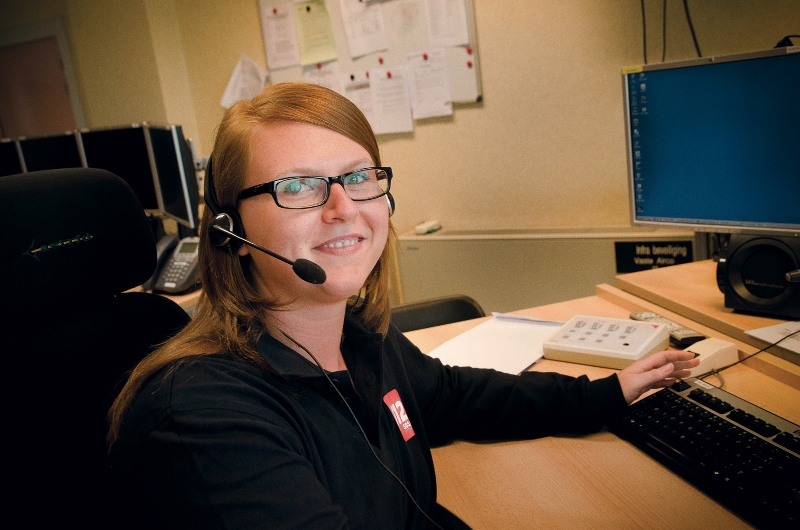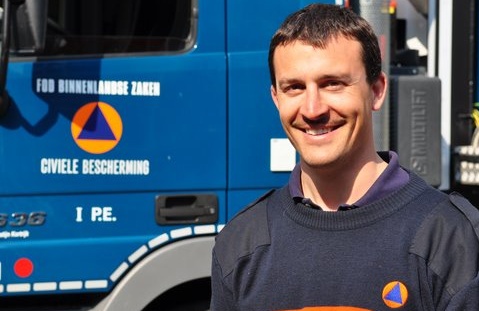About civil security
Who we are
The Directorate-General Civil Security is part of the Federal Public Service Home Affairs. 1262 employees work for our Directorate-General:
- 136 employees at the central directorate in Brussels,
- 284 operational agents and volunteers at the operational units of the Civil Protection
- 842 operators and call takers in the emergency centres 112 and 101
What we do
The Directorate-General Civil Security contributes to a liveable and safe society. Our main mission is to protect the citizens and goods in case of accidents or disasters.


- Our operators and call takers in the emergency centres answer 24/7 emergency calls for the emergency services and the police. They notify the necessary emergency services and provide them with the necessary information for a fast and efficient intervention.
- The agents of the operational units of the Civil Protection distribute sandbags in case of floods, cover your roof with a canvas after a storm, clean pollution in your street, distribute water bags in case of a water shortage, go and search for survivors after explosions and earthquakes and provide the fire departments, the police or the medical services with specialized, technical support in case of interventions in Belgium and abroad.
The safety of the operational people in the field - the firemen and the agents of the operational units of the Civil Protection - is our primary concern. Our engineers and experts constantly examine and test innovative techniques and new equipment that can be used by the emergency services. We prepare, together with the representatives of the fire departments, the statute, the organizational rules and the functioning of the fire departments and the emergency rescue zones. When they visit the fire departments, our fire department inspectors watch over the compliance with the law and give useful advice for a better functioning.
The experts of the Centre of Expertise for Civil Security (KCCE) prepare standard operational procedures based on the needs of the field. On the basis of the feedback they get, they try to improve the basic and advance training of the operational people, together with the training centres (the “fire schools”).
Our challenges
We put four priority goals first for the next five years:
- Develop, execute and accompany the emergency rescue zones.
- Improve the functioning of the emergency centres 112 for a fast and quality treatment of the emergency calls.
- Modernize the functioning of the operational units of the Civil Protection so that their performances meet the expectations of the fire departments, of other emergency services and of policymakers.
- Keep improving the safety and training of the operational agents in the field, as well as the working conditions of our operators and call takers.
Consultative bodies
Within the Directorate-General several consultative bodies are established, so that the operational prezones, the operational units of the Civil Protection and the operators and call takers can contribute their mite in the form of ideas, energy and innovations in our missions regarding regulations, the acquisition of equipment, the standard operational procedures, the training, …
Personnel
The concerted action committees of the Directorate-General Civil Security consist of the representative trade unions and government representatives. During the meetings of these committees one confers on aspects of the statute of the employees (except for the aspects for which a negotiation procedure is provided). Both for the operational units of the Civil Protection and the emergency centres, an intermediate concerted action committee was created. Moreover, the Directorate-General Civil Security regularly organizes a basic concerted action committee for each operational unit of the Civil Protection and for the different emergency centres.
Specifically for the voluntary personnel of the Civil Protection several provincial consultative committees and one interprovincial consultative committee are created.
- The mission of the interprovincial committee is to formulate advices and propositions on the statute or the working conditions of the voluntary personnel.
- The provincial committees formulate propositions on organizational problems that are typical of the voluntary personnel from their province.
Equipment
The acquisition commission provides advice regarding the acquisition of rolling equipment and individual and collective protective equipment. The advices concern the technical specifications that need to be included in the procurement guidelines.
The ASTRID Security Commission decides whether the presented new, big constructions and infrastructures need to be provided with ASTRID radio coverage for the emergency and security services as a safety measure.
Training
The Council for the training of the public fire departments has several missions:
- make the minister proposals regarding the trainings,
- give advice on the drafts of regulations,
- drawing up a report on the quality of the trainings organized by the different training centres.
The Programming commission has the task to:
- establish the needs on the subject of training,
- give an advice on the content of the syllabi,
- make the minister proposals regarding uniforming the courses and the exams,
- control the execution of its missions by the Drafting Committee.
The Commission for equation and exemption gives advice to the minister on requests for the equation of diplomas, courses or certificates and on requests for the exemption for courses and exams.
In 2003 a supra-provincial training council for the French-speaking and German-speaking firemen and a supra-provincial training council for the Dutch-speaking firemen were created. These training councils consist of the president and director of the respective firemen’s federation, technicians representing the fire departments, an operational representative of the Directorate-General and a professional officer representing the service for fire fighting and urgent medical assistance of Brussels. They take amongst other things care of the coordination and quality control of the trainings given by the provincial training centres.
Organization chart
The Directorate-General Civil Security is part of the Federal Public Service Home Affairs that consists of five directorates-general and two independent asylum bodies. The Director-General Geneviève Van Der Meeren has been at the head of the Directorate-General Civil Security.

